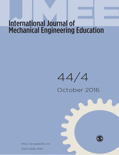
International Journal of Mechanical Engineering Education
Scope & Guideline
Transforming Teaching for Tomorrow's Engineers
Introduction
Aims and Scopes
- Innovative Teaching Methods:
The journal emphasizes the development and evaluation of novel teaching methodologies, including active learning, project-based learning, and gamification, to improve student engagement and understanding in mechanical engineering courses. - Integration of Technology in Education:
Research on the application of technology, such as virtual simulations, remote laboratories, and artificial intelligence tools, to facilitate learning in mechanical engineering is a core focus, reflecting the evolving educational landscape. - Curriculum Development and Assessment:
The journal publishes studies related to curriculum design, assessment strategies, and educational frameworks aimed at enhancing the educational outcomes and competencies of mechanical engineering students. - Industry and Education Collaboration:
Exploration of partnerships between educational institutions and industry to improve practical training, internships, and real-world applications of engineering principles in education. - Student-Centered Learning Approaches:
A focus on understanding student perceptions, experiences, and learning outcomes through various educational strategies, ensuring that teaching methods are aligned with student needs and expectations.
Trending and Emerging
- Postdigital Learning Environments:
There is a rising interest in postdigital pedagogies that address the complexities of teaching and learning in a technology-saturated world, focusing on the implications of digital tools in mechanical engineering education. - Collaborative Learning and Team Projects:
An increasing number of studies emphasize collaborative learning experiences, such as team-based projects and peer mentoring, which foster communication and teamwork skills among engineering students. - Sustainability and Renewable Energy Focus:
Research highlighting the integration of sustainability principles and renewable energy topics within mechanical engineering curricula is gaining traction, reflecting global priorities in engineering education. - Active Learning Strategies:
The effectiveness of active learning techniques, such as hands-on experiments and problem-based learning, is a burgeoning theme, showcasing the shift towards engaging students more deeply in their education. - Use of Simulation and Virtual Labs:
The incorporation of simulation software and virtual laboratory environments is becoming increasingly prominent, providing students with practical experiences that may not be feasible in traditional lab settings.
Declining or Waning
- Traditional Lecture-Based Teaching:
There is a noticeable decline in publications centered around traditional lecture formats, as the journal increasingly favors interactive and student-centered approaches to learning. - Static Assessment Methods:
Research related to static or one-time assessments is becoming less frequent, with a shift towards more dynamic and continuous assessment strategies that reflect real-world applications. - Narrow Focus on Theoretical Concepts:
Papers concentrating solely on theoretical aspects of mechanical engineering without practical application or teaching relevance are appearing less often, as the journal seeks to bridge theory with practice. - Limited Scope of Learning Materials:
The exploration of conventional learning materials like textbooks is waning, as there is a growing interest in diverse and innovative resources that enhance experiential learning. - Single-Discipline Focus:
The journal is moving away from narrowly focused studies that only address mechanical engineering, instead embracing interdisciplinary approaches that integrate insights from related fields.
Similar Journals
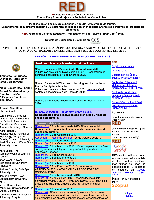
RED-Revista de Educacion a Distancia
Fostering Innovation in Distance Education MethodologiesRED-Revista de Educacion a Distancia is a premier open-access journal published by UNIV MURCIA in Spain, dedicated to advancing research in the fields of education and computer science applications. Since its inception in 2001, the journal has served as an essential platform for disseminating innovative research and practical applications of distance education methodologies. With an impressive impact factor and ranked in Q2 across both Computer Science Applications and Education categories as of 2023, RED is recognized for its significant contribution to the scholarly community, particularly within the Social Sciences and Engineering domains. Researchers and professionals are invited to explore cutting-edge studies that underpin pedagogical effectiveness and technological integration in educational settings. Based at the Edificio Pleiades Campus de Espinardo in Murcia, RED continues to foster an engaging dialogue among academics, providing insights that propel the field forward.
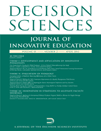
Decision Sciences-Journal of Innovative Education
Advancing the dialogue between education and decision-making excellence.Decision Sciences - Journal of Innovative Education is a prestigious academic journal published by WILEY, focusing on the intersecting fields of decision sciences, education, and management. With an ISSN of 1540-4595 and an E-ISSN of 1540-4609, this journal offers valuable insights and research findings aimed at fostering innovative educational practices and decision-making processes. As of 2023, it boasts an impressive Q2 ranking in several categories, including Business, Management and Accounting, Decision Sciences, and Education. This positions it within the top tier of journals in its field, reflecting its commitment to high-quality scholarship. Researchers and educators benefit from its extensive coverage of contemporary topics and methodologies, making it a vital resource for those seeking to enhance their understanding and application of innovative strategies in education. Although it does not currently offer open access, the journal remains accessible via institutional subscriptions, ensuring that its impactful research is readily available to a broad audience. The journal's scope spans from 2011 to 2024, allowing for a comprehensive exploration of evolving trends in decision sciences and education.

Education for Chemical Engineers
Exploring Innovative Pedagogies in Chemical EngineeringEducation for Chemical Engineers, published by Elsevier, stands at the forefront of academic discourse in the realms of chemical engineering and educational methodologies. This esteemed journal, with an E-ISSN of 1749-7728, has established itself as a premier platform for the dissemination of research from 2006 to 2024, achieving a remarkable position within Q1 of both the Chemical Engineering (miscellaneous) and Education categories as of 2023. With a significant impact factor and high rankings in Scopus—77th out of 1543 in Social Sciences Education and 42nd out of 273 in General Chemical Engineering—the journal plays a crucial role in bridging the gap between chemical engineering theory and practical pedagogical approaches. It provides researchers, professionals, and students a unique opportunity to explore innovative educational practices, methodologies, and case studies that cater to the intricacies of chemical engineering education in a rapidly evolving technological landscape. This journal’s commitment to advancing knowledge ensures it remains indispensable for those who aim to enhance the quality and effectiveness of education in chemical engineering.
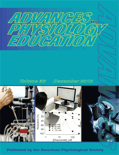
ADVANCES IN PHYSIOLOGY EDUCATION
Innovating Teaching Practices for Tomorrow's ScientistsADVANCES IN PHYSIOLOGY EDUCATION, published by the American Physiological Society, is a leading journal dedicated to the field of physiology education, with a commitment to advancing teaching practices and pedagogical strategies in this vital discipline. Established in 1998, the journal has consistently provided a platform for original research and discussion, fostering the improvement of educational methodologies. With an impressive impact factor and ranked in Q2 for Education and Q3 for Physiology, it reflects a robust academic influence within the research community. The journal ranks #458 out of 1543 in Social Sciences - Education and #130 out of 193 in Biochemistry, Genetics, and Molecular Biology - Physiology according to Scopus, highlighting its critical role in shaping physiology education. While it operates on a subscription model, its focus remains on promoting innovative education practices that benefit both educators and students alike. This journal is essential reading for anyone looking to enhance their understanding of physiology teaching and learning.
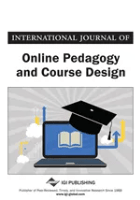
International Journal of Online Pedagogy and Course Design
Connecting theory and practice in online pedagogy.The International Journal of Online Pedagogy and Course Design, published by IGI Global, serves as a vital resource for researchers, educators, and practitioners interested in the integration of technology in education. Since its inception in 2017, this journal has focused on the latest advancements in online teaching methodologies, course design, and assessment frameworks, contributing to the dynamic field of educational technology. It is indexed in Scopus and currently ranks Q4 in the Education category, reflecting its growing influence within the academic community. The journal provides an invaluable platform for sharing innovative research and practical insights that enhance online learning experiences, crucial in today’s digitally-driven educational landscape. With an ISSN of 2155-6873 and E-ISSN of 2155-6881, the journal is dedicated to fostering a collaborative environment where ideas and practices in online pedagogy can thrive.
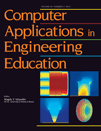
COMPUTER APPLICATIONS IN ENGINEERING EDUCATION
Empowering engineering education through technology.COMPUTER APPLICATIONS IN ENGINEERING EDUCATION, published by Wiley, is a leading journal dedicated to the intersection of computer science and engineering education. With its ISSN 1061-3773 and E-ISSN 1099-0542, this journal has become a vital resource since its inception in 1992, providing valuable insights and advancements within its scope. Renowned for its high impact, the journal is categorized in the Q1 in Education and Q1 in Engineering (miscellaneous) quartiles, reflecting its significant contribution to the fields of education and engineering. The journal holds impressive Scopus rankings, including Rank #41 in General Engineering and Rank #38 in General Computer Science, positioning itself within the top echelons of relevant academic disciplines. Although it is not currently an open-access publication, it provides researchers, educators, and students with a platform to explore innovative computer applications in engineering contexts. This journal not only serves as a repository of knowledge but also fosters a community for professionals interested in enhancing educational methodologies through technology.
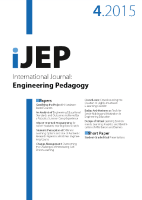
International Journal of Engineering Pedagogy
Shaping the Future of Engineering Pedagogy GloballyInternational Journal of Engineering Pedagogy (ISSN: 2192-4880) is a leading academic journal dedicated to the advancement of educational practices within the engineering discipline. Published by the International Federation of Engineering Education Societies (IFEES), this open-access journal has been making scholarly contributions since 2011, enabling global access to cutting-edge research and methodologies. Based in Austria, the journal serves as a vital platform for researchers, educators, and industry professionals to share innovative strategies and pedagogical advancements that enhance engineering education. With a remarkable Q2 ranking in both Education and Engineering (miscellaneous) categories for 2023, it showcases studies that drive excellence in teaching and learning processes. The journal's significant presence in reputable databases, such as a rank of #228 out of 1543 in Social Sciences Education and #60 out of 307 in General Engineering within the Scopus index, underscores its influence and relevance. By converging valuable insights from 2018 to 2024, the journal continues to shape the future of engineering pedagogy, making it an indispensable resource for scholars and practitioners alike.
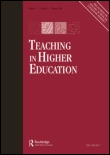
TEACHING IN HIGHER EDUCATION
Championing effective strategies for student engagement.TEACHING IN HIGHER EDUCATION is a premier academic journal published by Routledge Journals, Taylor & Francis Ltd, dedicated to advancing the scholarship and practice of teaching within the higher education sector. With an ISSN of 1356-2517 and an E-ISSN of 1470-1294, this journal is widely recognized for its profound impact in the field, boasting a 2023 category rank of Q1 in Education, placing it in the top tier of educational research. Its commitment to fostering an inclusive and dynamic discourse on pedagogical methods and learning frameworks makes it essential reading for researchers, educators, and policymakers alike. Spanning topics such as student engagement, curriculum development, and innovative teaching strategies, TEACHING IN HIGHER EDUCATION aims to contribute to ongoing conversations and practical applications that enhance the educational landscape. While an Open Access option is not available, the journal maintains a robust readership, with its articles being rigorously peer-reviewed and disseminated to reflect cutting-edge research trends and practices in education.

Cukurova University Faculty of Education Journal
Advancing Educational Insights for a Brighter TomorrowThe Cukurova University Faculty of Education Journal, published by CUKUROVA UNIV, serves as a vital platform for scholarly discourse in the field of education. With the ISSN 1302-9967, this journal is dedicated to publishing rigorous research and innovative studies that address critical issues within educational theory and practice. Though the publication operates on a closed-access model, it remains committed to enhancing accessibility by providing high-quality, peer-reviewed content that contributes to the body of knowledge in education. Situated in Adana, Turkiye, the journal aims to foster collaboration among researchers, educators, and policymakers, ultimately enriching the educational landscape. As an essential resource for those invested in advancing pedagogical methods and educational policies, the Cukurova University Faculty of Education Journal is poised to make significant contributions in its field.

Journal of Science Education and Technology
Fostering Excellence in Science Education and Engineering.The Journal of Science Education and Technology, published by SPRINGER, stands as a premier platform in the fields of education and engineering, recognized with a prestigious Q1 ranking in both categories as of 2023. With an ISSN of 1059-0145 and an E-ISSN of 1573-1839, this journal serves as a pivotal resource for researchers, educators, and practitioners alike, emphasizing the integration of scientific inquiry and technological advancements in educational contexts. Since its inception in 1992, the journal has consistently provided high-quality, peer-reviewed research that shapes contemporary practices and methodologies in science education. With its notable Scopus rankings, including a 95th percentile in Social Sciences Education, the journal is essential for anyone eager to enhance their understanding of effective teaching in STEM fields. While the journal is not open access, its contributions are invaluable to advancing knowledge and innovations that are crucial for the progressive education landscape, making it a must-read for scholars and students committed to excellence in science education.